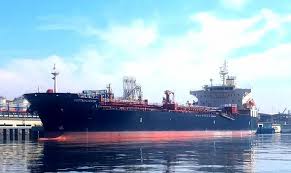Illegal Oil Waste Discharge and Maritime Penalties
When it comes to shipping regulations, no one is above the law—especially when it involves damaging aquatic environments. A recent case has spotlighted this with a hefty $2 million fine imposed on a shipping company due to deliberate illegal oily waste dumping in the Gulf. The offending vessel, the Motor Tanker Swift Winchester, was found to have discharged oily bilge water and waste unlawfully while masking the activity in official records.
Details of the Violation
The United States Department of Justice confirmed that V. Ships Norway admitted to breaching the Act to Prevent Pollution from Ships. An engineering manipulation within the ship’s systems allowed oily waste to bypass treatment and discharge directly into the sea, circumventing established environmental safeguards.
Between February and August 2022, a discharge system was rigged by connecting a hose from the incinerator waste oil tank to the ship’s sewage holding tank. This setup enabled the transfer of oily waste straight into the sewage tank, from where it was released unlawfully into the Gulf waters. This mechanic hack was a clandestine effort that avoided detection by falsifying oil record book entries when the ship docked at U.S. ports.
Actions Taken by the Crew and Authorities
Following complaints from a crew member to company management, an internal inquiry was launched, resulting in the dismissal of the chief engineer responsible. Yet, pressing issues remained as the newly appointed chief engineer reportedly ordered cleanup measures that merely swabbed oily waste overboard under the guise of maintenance, intensifying environmental damage.
U.S. Coast Guard investigations were pivotal, collecting evidence including photographs from the crew that captured the ongoing illegal discharges. The case serves as a stark warning about the lengths some operators might pursue to bypass environmental regulation and the relentless scrutiny by law enforcement.
Environmental and Legal Implications
Environmental impact of such oil discharges can be severe, threatening marine biodiversity and coastal health. The oily contamination disrupts aquatic life cycles and can lead to long-term damage to fisheries and tourism economies.
Legal enforcement proves essential to uphold maritime environmental standards. The prosecution of this case underscores government commitment to enforcing pollution laws robustly, signaling to the maritime industry that no fraudulent activity will be tolerated. Maintaining clean, law-abiding shipping corridors is not just about ecological preservation; it’s about sustaining the operational integrity and reputation of maritime logistics worldwide.
Regulatory Context
| Aspect | Detaylar |
|---|---|
| Law Violated | Act to Prevent Pollution from Ships |
| Penalty | $2 Million Fine |
| Vessel Involved | M/T Swift Winchester |
| Illegal Practice | Oily waste discharge & false record keeping |
| Time Period | February – August 2022 |
| Authorities | U.S. Department of Justice, Coast Guard |
Ripple Effects on Shipping and Logistics
For the shipping and logistics sector, incidents like this can create waves beyond the immediate environmental threat. They impact the credibility of shipping companies and complicate international maritime operations which hinge on trust, transparency, and compliance. With stricter monitoring and escalating penalties, logistic operators must now emphasize >compliance-driven strategies< to avoid disruptions and costly legal repercussions.
Such cases serve as a wake-up call for companies to invest in improved waste management systems, crew training, and transparent operational reporting. In the logistics chain, delays due to investigations and sanctions can cascade to affect delivery schedules, freight costs, and customer trust.
Environmental Responsibility in Logistics
- Transparent reporting: Accurate record-keeping protects companies from legal trouble.
- Preventive maintenance: Proper care of onboard equipment minimizes risks of illegal discharges.
- Staff accountability: Empowering and incentivizing crews to report non-compliance.
- Technological upgrades: Incorporating sensors and automated systems to monitor waste treatment.
Personal Experience Trumps All
Though official reviews and honest feedback on such incidents shed light on company practices, nothing beats firsthand experience to validate the trustworthiness of a logistics provider. GetTransport.com offers an extensive platform where you can arrange cargo transports at competitive prices worldwide. By leveraging its transparency, affordability, and diverse network, customers are equipped to select services with confidence—avoiding unnecessary expenses and potential pitfalls.
Unlike the “one-size-fits-all” approach, GetTransport.com gives you the freedom to tailor shipments—whether moving home, dispatching cargo, or transporting heavy-duty items like vehicles and bulky freight. This customer-centric approach aligns perfectly with the demand for reliable and responsible shipping in today’s fast-evolving logistics landscape. Şimdi rezervasyon yaptırın at GetTransport.com and enjoy hassle-free global freight solutions.
Outlook for Logistics
While this particular $2 million penalty may represent a firm action more localized than globally transformative, it highlights the importance of vigilance within maritime logistics. Cases of illegal waste dumping, if unchecked, could erode trust in supply chains dependent on ocean transport.
GetTransport.com stays tuned to such developments to ensure its clients benefit from partners who prioritize regulatory adherence and sustainable practices. Taking informed action benefits shippers and the environment alike. Start planning your next delivery and secure your cargo with GetTransport.com.
Sonuç
In summary, the V. Ships Norway incident involving the M/T Swift Winchester shines a spotlight on the ongoing battle against maritime pollution and fraudulent practices. Environmental laws such as the Act to Prevent Pollution from Ships carry significant penalties which underscore the vital need for responsible shipping behavior. For the logistics industry, this serves as a reminder that managing risks around cargo, freight, and shipment is critical to sustaining reliable and lawful transport operations. Platforms like GetTransport.com embody these principles by offering comprehensive, affordable, and dependable freight and forwarding solutions tailored to diverse needs—whether international distribution, bulky cargo hauling, or house moves. By trusting such services, businesses and individuals enhance the safety, transparency, and efficiency of their shipping endeavors.

 V. Norveç Gemilere, Körfez'de M/T Swift Winchester'dan Yasadışı Yağ Atığı Boşaltımı Nedeniyle 1 Milyon Tl Para Cezası Verdi">
V. Norveç Gemilere, Körfez'de M/T Swift Winchester'dan Yasadışı Yağ Atığı Boşaltımı Nedeniyle 1 Milyon Tl Para Cezası Verdi">